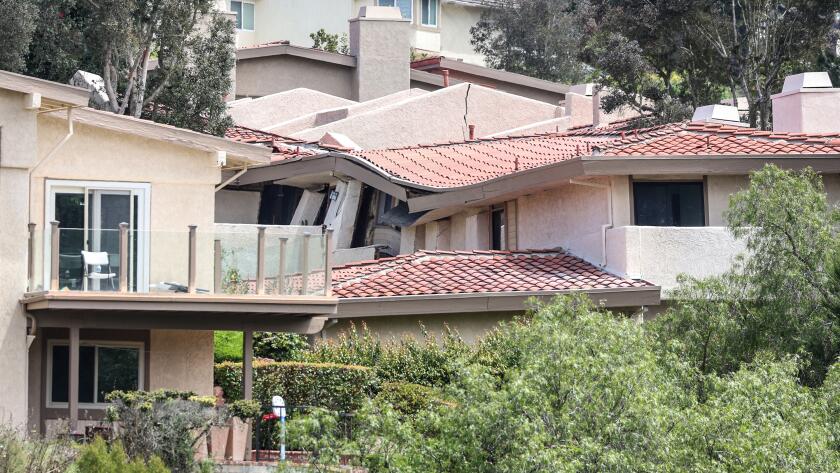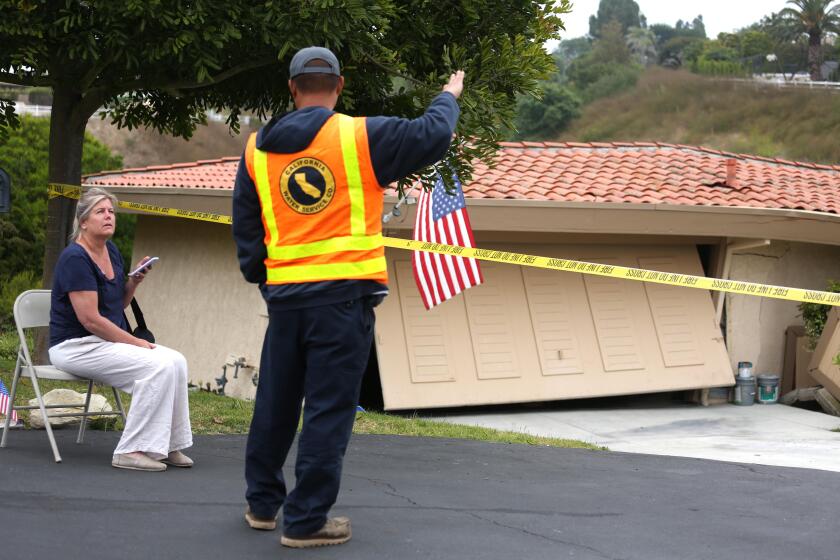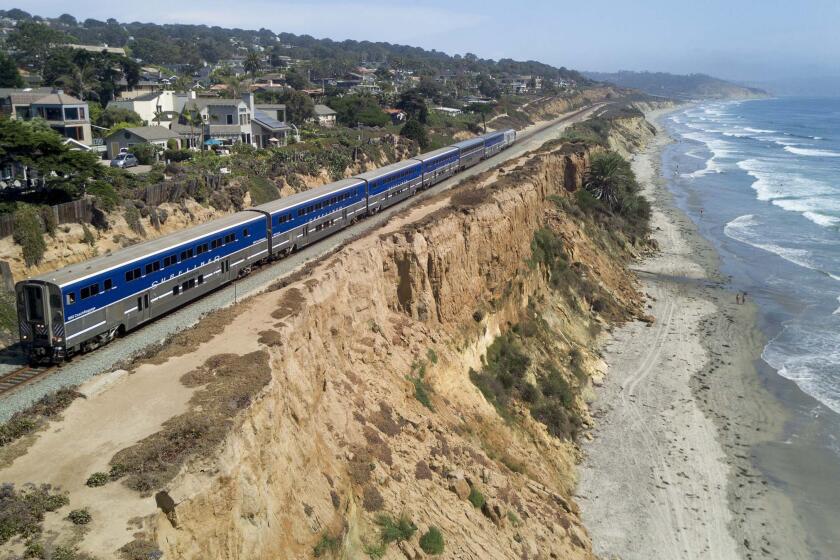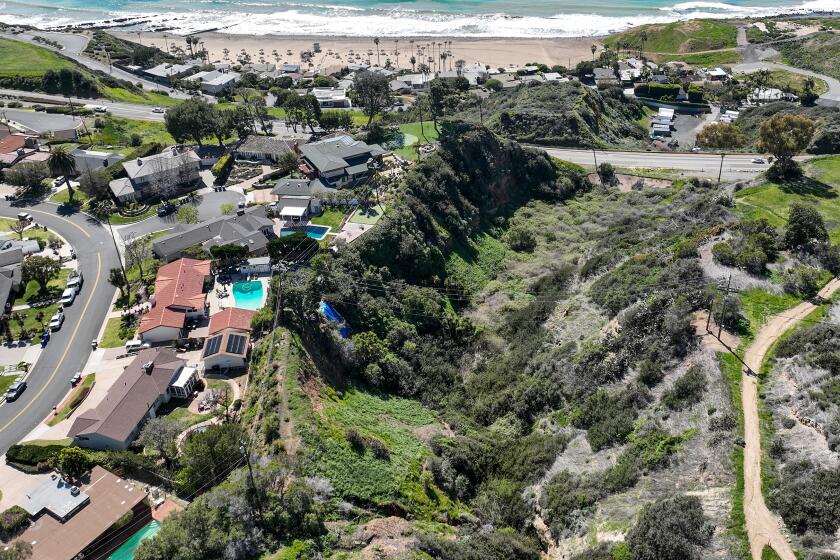Rolling Hills Estates residents lose their homes and the ground they sat on
- Share via
The ground is still moving in Rolling Hills Estates, more than a day after 12 homes were evacuated because of major ground slides.
- Share via
Katie Schwartz thought she was probably overreacting.
But after noticing a few small cracks in her Rolling Hills Estates home, she decided to call the Fire Department on Saturday to check it out.
“I thought I was crazy,” Schwartz said. Worst-case scenario, she thought, a wall might need repairs.
“They came out and said, ‘You’re not overreacting,’” said Schwartz, 57.
Hours later, she, her husband, their daughter and almost half of their small street on Peartree Lane were evacuated and 12 homes were red-tagged, as the land beneath the picturesque neighborhood had started to shift, seemingly inexplicably.
By Monday, multiple homes — including Schwartz’s — had slid down the hillside that borders the street’s southeast side, dipping below what remained of their driveways, some almost completely hidden from the road they previously lined.
Garage doors were almost flattened, roofs had caved in, massive crevices exposed beams and pipes. Many of the homes were already lost.
“Just shock,” Schwartz said Monday, taking in the escalating damage. “It just changes your whole life.”
For the record:
12:42 p.m. July 11, 2023A previous version of this story said the Rolling Hills Estates neighborhood affected by the slides is on the northern side of the Palos Verdes Peninsula. It is in the southwestern part of the peninsula.
The homes were red-tagged after firefighters and investigators found them visibly leaning Saturday afternoon because of massive movement on the hillside. It’s still unclear what initially caused the ongoing landslide in the community, which is on the southwestern side of the Palos Verdes Peninsula. A geologist or soil expert hasn’t yet been out to the site, officials said.
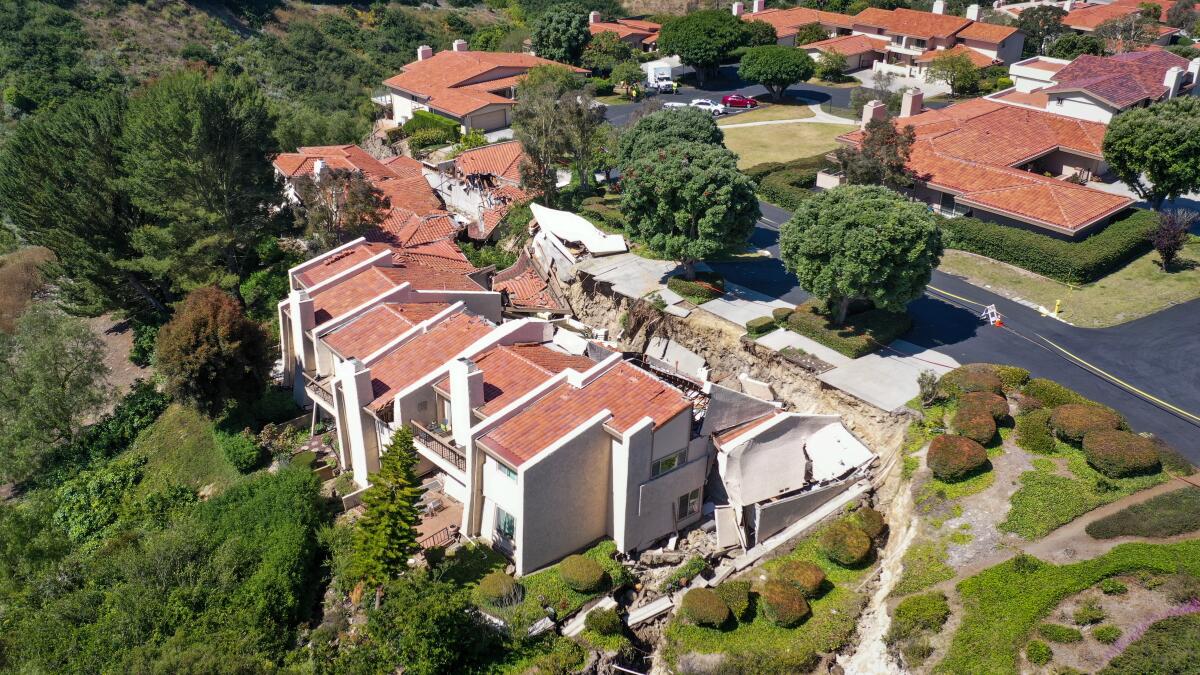
Los Angeles County Fire Chief Anthony Marrone said Monday evening that his crews continued to monitor the still-moving ground. Although they had documented damage on all 12 red-tagged units, he said no other nearby homes had yet been affected. At least eight homes have been completely ruined in the collapse.
Marrone said his team would remain on site until the shifting ceased.
“We don’t know how long these homes are going to continue to move,” he said. We’re “waiting to see what the determination is going to be.”
The cracks in the homes, which are on Peartree Lane bordering a canyon, were visible on the outside and inside.
David Zee is still hopeful his family’s new home — where they moved just two months ago — can withstand the landslide, as it remains one of the few red-tagged structures still upright.
“We have a glimmer of hope,” Zee, 52, said Monday afternoon as he assessed the street’s damage.
He and his family were told by emergency officials they had just 20 minutes to get out of their home Saturday night.
“It’s just amazing how quickly this all happened,” said Zee, showing pictures of his neighbor’s homes standing intact just 24 hours earlier. “It’s like it imploded in.
“The good thing,” he added, “is that nobody was hurt — all the neighbors got out safely.”
As L.A. County Supervisor Janice Hahn toured the street again Monday, she affirmed her prior assessment that most of the homes would completely fall into the canyon. She estimated they had fallen another 20 feet since Sunday afternoon.
“They’re absolutely collapsing on top of themselves, the roofs are at ground level,” Hahn said Monday. “The force of gravity is taking them. … These homeowners have lost their homes and, really, the land that the home sits on is also gone.”
Hahn first visited the street late Saturday and said she could hear the “snap, crackle, pop” of shifting homes, but the movement was minor. By Sunday, the homes had fallen six to 10 feet down the ravine. Monday’s damage was “astonishing,” she said.
“There’s nothing we can do, I’ve been told, to stop what’s happening,” Hahn said. “That’s why it’s wait-and-see at that point. Waiting for the homes to fall.”
Hahn said her team had recommended geologists who could come out to the site, but the neighborhood’s homeowners association must hire the expert. Pete Goodrich, a building official with the city of Rolling Hills Estates, said Sunday that the land movement “could be due to the extensive rains that we’ve had ... but we don’t know.”
The extent of the land fissure, or how it might further grow, is still unclear.
“Even the people who didn’t fall in, are they going to have to relocate as well?” Steve Hung, 52, said Monday morning. His home was still considered safe Monday, but Hung worried about how widespread the geological issues could go. His home sits behind Peartree Lane and borders the top of the canyon.
“I’m hoping we’re set back enough,” Hung said. “That’s a scary thought. ... You’re at risk of losing everything.”
Landslides in Orange County continue to disrupt the coastal rail line that carries Amtrak’s Pacific Surfliner. Is it time to trade stunning views for a reliable route?
Hahn helped residents who had already lost their homes to connect with the county assessor to jump-start the process of receiving a property tax waiver. She said she also reached out to Gov. Gavin Newsom about the situation Monday but hadn’t yet heard back.
Rolling Hills Estates Mayor Britt Huff said the city planned to declare an emergency at its Tuesday council meeting.
All the evacuated residents had found somewhere to relocate, most with relatives, Hahn said. At least two are traveling outside the country and haven’t yet returned home.
“We’ve got the whole county family to help,” Hahn said. “It’s just so horrible, I’ve never seen anything like it.”
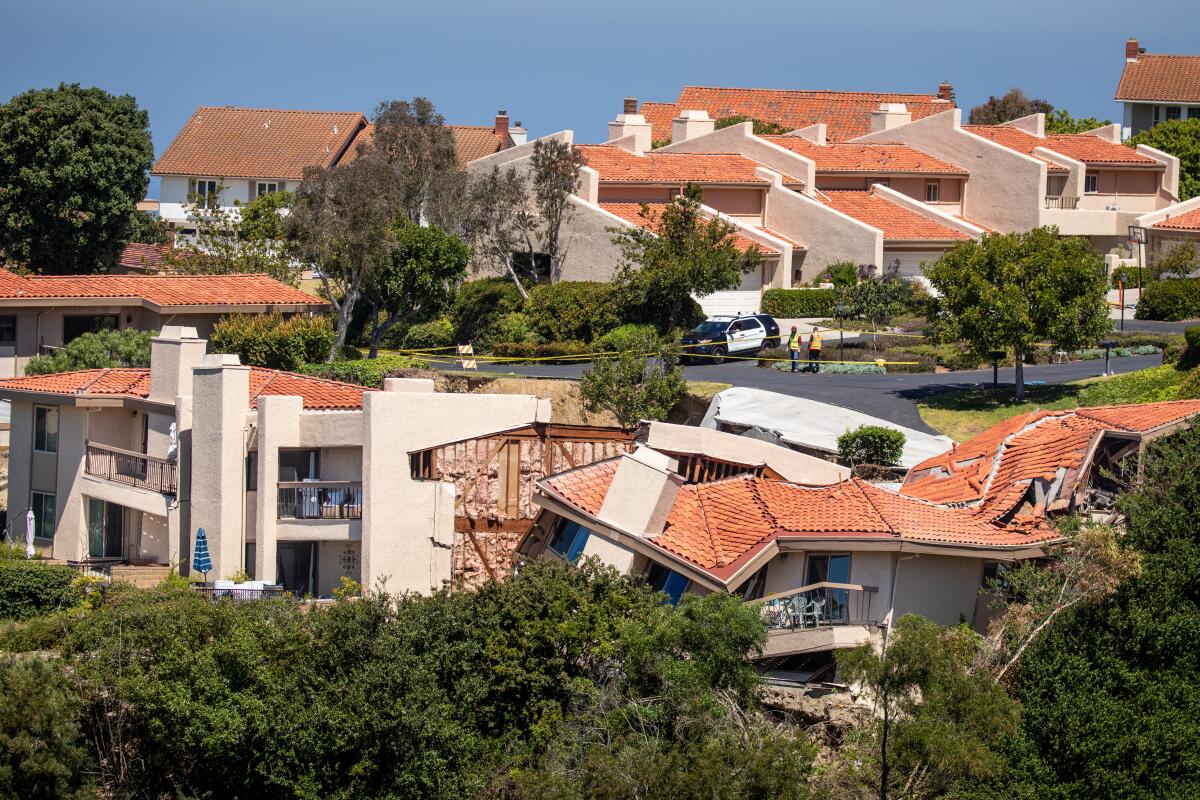
The 12 evacuated homes have had gas, water and power shut off, according to the Los Angeles County Fire Department, and 16 additional homes have had their gas shut off to ensure the shifting homes don’t cause a leak. Crews from Southern California Gas Co. and Southern California Edison were on the scene Monday.
Firefighters and investigators who examined the land on Peartree Lane on Saturday afternoon after Schwartz’s call found damaged homes and garages.
Officials said a visible fissure was winding its way between the homes that were affected.
A decades-long landslide has reshaped a 240-acre part of Palos Verdes Peninsula known as Portuguese Bend. Rancho Palos Verdes is mounting a plan to slow it.
Rolling Hills Estates is on the Palos Verdes Peninsula in southwestern Los Angeles County, where a big chunk of land is slowly sliding into the sea.
A dormant landslide complex that shaped the south side of the peninsula for hundreds of thousands of years was reactivated 67 years ago, threatening to destroy homes and infrastructure in the hillside communities that dot the landscape.
Palos Verdes Peninsula has long been prone to landslides, and the most dramatic one is affecting Portuguese Bend, an area named after a Portuguese whaling operation, now known for its natural beauty and native vegetation.
The Portuguese Bend landslide was triggered in the summer of 1956 — nearly two decades before Rancho Palos Verdes became a city — when a Los Angeles County road crew was constructing an extension of Crenshaw Boulevard that would run from Crest Road to Palos Verdes Drive South.
City officials in Rancho Palos Verdes — which surrounds the sliding Rolling Hills Estates neighborhood — are considering a $25-million project that would involve a series of wells to pull water out of the ground and send it into the ocean, in effect drying up the lubricated landscape enough to stop the land from sliding.
City Manager Ara Mihranian said officials had to take action before it’s too late.
“Something catastrophic is imminent,” Mihranian told The Times in March.
The neighborhood where the Peartree Lane homes are sliding was built in 1978, Huff said.
Schwartz, the homeowner who noticed the cracks in her home, has relocated temporarily to a Redondo Beach hotel. It could be years before they get back on track, she said.
“Retirement may never happen now,” she said. But it was the thought of leaving behind her community that brought tears to her eyes.
“That’s the only thing I care about,” Schwartz said. “We’ll never get neighbors like that again. Whether we ever get money, or we don’t get money to buy somewhere else … we’ll never get the neighbors back.”
Times staff writer Jack Flemming contributed to this report.
More to Read
Sign up for Essential California
The most important California stories and recommendations in your inbox every morning.
You may occasionally receive promotional content from the Los Angeles Times.
